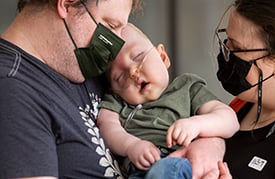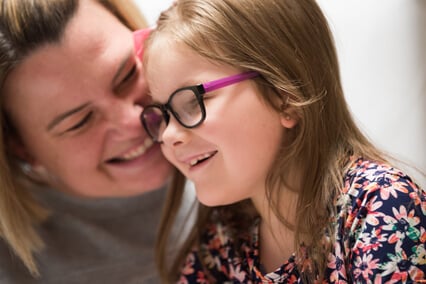Chromosomal Abnormality: Odin’s Story
Before Odin Buser was even conceived, there was a small chance he would have a rare chromosomal abnormality due to family history. The abnormality further reduced the odds that he could be carried to term to less than 1%. But after three miscarriages, his parents, Mark and Courtney Buser, were prepared to fight for him in every way when they found out they were pregnant.
During Courtney’s 20-week ultrasound, they were advised to terminate the pregnancy after discovering chromosomal abnormalities that could cause a miscarriage. They refused to accept this as their fate and decided to seek a second opinion with Children’s Mercy.
“Each department assured us they’d be with us during every step of the process,” Mark said.
Living with a chromosomal abnormality
Odin made his debut into the world one week early in the Elizabeth J. Ferrell Fetal Health Center after OB/Gyn Timothy Bennett, MD, FACOG, made the decision to perform an emergency C-section, working closely with the care team to ensure a safe and smooth delivery.
“I don’t remember a lot from that day,” Courtney said. “We were very reassured and very comforted because of their communication and support.”
By day two, Odin already had a full brain scan, an EEG, VP shunt surgery and underwent various tests and procedures. Mark and Courtney had done extensive research on what to expect prior to Odin’s arrival, and the physicians and staff had walked them through steps that would need to be taken once he was born, so they felt reassured Odin would be cared for.
The Beacon Program
Fast forward one year—Mark and Courtney met with Beacon Program staff for a care conference when Odin was hospitalized. Odin had been having frequent seizure episodes every week or two for 15 to 20 seconds all day long with recurrent vomiting. The hospital team and specialists, including neurology, gastroenterology, and nephrology, all worked together to help control his seizures and figure out the best feeding plan. Because Odin was vomiting so frequently, it was difficult to be in public. He was in the emergency department every two weeks and they were ready for a change in his care.
The goals the Beacon team put in place were simple: keep Odin home for longer periods of time so they didn’t have to keep making ED visits, and be the first point of contact to relay his care, whether seen in Beacon Clinic for an ill visit, going to the ED, or needing further evaluation from a specialist. And that is exactly what started happening.
The Beacon team worked together to meet Odin's unique needs as a new medical home. They closely communicated with Odin's specialist for continuity of care. They worked with nephrology for his specialized blended diet through his G-tube, which substantially improved his vomiting. They updated neurology when Odin had any neurologic changes so that treatments were made to reduce his seizure episodes to keep him comfortable. They talked to pulmonology when Odin required more respiratory support or needed an adjustment to his breathing treatments.
With the Beacon team in place, Courtney and Mark felt like they could finally start experiencing the little joys in life with their son, like taking him to the zoo, the aquarium and other places most people might take for granted.

The team committed to Odin’s care work collaboratively. They have weekly meetings about acute patient updates, and they are able to bounce ideas off one another. Whether it’s the pharmacist helping to optimize his medications to make him more comfortable or having a point of contact within the Beacon Program to go over any minor changes in his continuity of care, Mark and Courtney are grateful and said they don't know where they'd be without the Beacon Program.
“One of the benefits of the Beacon Program is we have more good days than bad days,” Mark said. “We never know when his next emergency surgery will be. It drives home the importance of time. Seeing the joy on his face outside the house or hospital ... words can’t describe how good those days are.”
Chromosome 15q duplication and deletion syndrome: Marcus' story
Shaun and Tasha Rye share what a difference the Children’s Mercy Beacon Program has made for their son, 2-year-old Marcus. Marcus has a medically complex condition caused by chromosome 15q duplication and deletion syndrome, a genetic defect, resulting in global developmental delays, congenital heart disease including atrioventricular septal defect with restrictive VSD, DORV and PDA, supraventricular tachycardia, gastroesophageal reflux disease, intestinal malrotation, asthma, dystonia, cleft palate, and bilateral club feet. Marcus also has bilateral sensorineural hearing loss, wears glasses, has a gastrostomy tube for medications, and takes continuous jejunostomy tube feedings.
Rett syndrome: Quinn's story
Quinn Cunningham has Rett syndrome, a progressively debilitating neurodevelopmental disorder. That's why her family relies on the Beacon Clinic to coordinate her complex care for respiratory, gastrointestinal and neurological issues.
